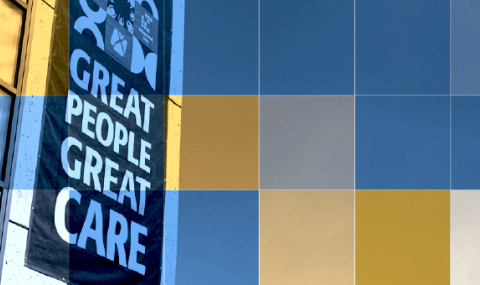The Epilepsy Monitoring Unit (EMU) is an 11-bed, co-ed unit at London Health Sciences Centre's (LHSC) University Hospital in London. It is the centrepiece of the LHSC Epilepsy Program, which has been helping to diagnose epilepsy and related conditions since 1977. The EMU is the largest unit of its kind in Canada. The purpose is to provide continuous video/EEG monitoring for adolescents and adults who are undergoing investigation of seizures and related events.
To capture seizures and pinpoint their origin in the brain as they happen in real-time, each bed is equipped with a video camera, microphone, and state-of-the-art EEG equipment to monitor patients 24 hours a day without interruption. There is a nursing station with one to two nurses present at all times for patient care.
What To Expect During Your Stay
The patients in the EMU are male and female and range in age from older adolescents to senior adults. The EMU is a friendly and welcoming environment. Many lasting friendships and supportive relationships have been developed.
You may see other patients having different types of seizures. All seizures are individual. Some people may have large seizures and others may have small ones. Everyone is in good hands under the watchful eye of trained staff.
With a large number of patients in the EMU at one time, you may meet people who think and act differently than you do. You must be able to tolerate these personal differences. Rude or disrespectful language and physical aggression are unacceptable. All patients need to respect each other’s space and privacy.
You are to maintain as normal an activity level as the monitoring allows. You are not considered an ill patient, but you must stay in the unit at all times so that we can capture the best information about your seizures to help you. Failure to follow this policy will result in discharge from the EMU.
All patients must take responsibility for their belongings and maintain a safe, uncluttered environment around their beds. Patients make their own beds daily. Bed linen is changed on a weekly basis or sooner if needed.
The average length of stay is five to 10 days, but your length of stay is hard to predict because it varies depending on the number and types of seizures recorded. Some patients stay longer, particularly if seizures are infrequent or if they need specialized recording. It is not uncommon to have fewer seizures than at home; medication may be reduced to increase the chances of capturing seizures.
When discharge time comes, you may have little notice to arrange your transportation home. It is required to be out of the bed at the time specified by your nurse. If you need a place to wait on the day of discharge, there is a lounge across the hall for your convenience. If you are dependent on air transportation, an open plane ticket would be advisable.
The Team
During your stay you may encounter multiple professionals who are part of our EMU team:
- One to two nurses are on staff and will be sure that you are safe during a seizure. Nurses will also watch and record your seizure and be there to help as needed.
- A Neurology fellow or resident physician will check in with you daily.
- Epileptologists (specialty neurologists in charge of your care) will review your EEG results and activity daily and will visit you at least twice each week to discuss your progress and answer questions. You may have more than one epileptologist looking after you during your stay.
- EEG technologists will apply and remove the recording wires and test the recording system every day.
- A Neuropsychologist may see you and ask you to participate in testing your thinking skills (e.g., attention, memory, language, etc.) with a psychometrist.
- A psychologist may talk to you and might ask you to complete a questionnaire that asks personal questions to help with your overall diagnosis and care.
- A social worker or occupational therapist may see you if required.
- A neurosurgeon may visit you if surgery is an option or this may be arranged as an outpatient.
Sometimes a large team of professionals will visit you at your bedside to discuss your care. These visits usually occur Monday and Thursday afternoons. Some patients like to have a family member, or friend, be present to hear and remember the information and to ask questions. At other times, one professional may see you individually.
You may want to have a small notebook to record the information you obtain and record questions you want to ask the team.
Safety
Each bed in the unit is equipped for 24-hour observation and all patients receive care from specially trained nursing staff.
You must remain in the unit. This is make sure the medical team can capture the required monitoring and also because your seizure medications are decreased. When medication levels are low, the risk of injury from falls is increased. At night, the nurse will raise the side rails on the bed for your protection.
Observation and Privacy
It is the nurses’ responsibility to observe and record every aspect of your seizure. You will be working closely with the nurses; therefore, you must be present in the unit at all times.
There are private washrooms in the unit as well as two showers. When you shower, the nursing staff may confirm verbally that you are OK. The washrooms have doors that are designed for emergency access.
Because the nurses must be able to see you to do a proper recording, you will experience a reduced amount of privacy. At night, the curtains around your bed must remain open while you sleep. During the daytime, the team will include you in a discussion about your care at your bedside.
EEG Monitoring and Video
You will have EEG recording wires, similar to outpatient EEG wires, attached to your head during your stay. These wires are connected to a small recording unit. The recording unit sends your brain wave information to a bedside receiver by way of a connecting cord. The cord must stay plugged in otherwise important information that your medical team needs for treatment may be missed, prolonging your stay.
Cameras are mounted on the ceiling for 24-hour sound and video recording. We ask that you stay in view of the camera as much as possible. The camera can turn in different directions so that you may move about the room while being monitored. You must stay plugged in to the EEG monitor, except for when you're in the washroom but if you unplug to leave the room, the recording stops. You can shower every day, but the wires must be protected from the shower water. Please ask the nurse for help. Periodically, the wires will be removed from your head and you will be allowed to wash your hair.
What To Bring
Please bring your current medications with you in their original containers, as you will continue taking your own medication until instructed otherwise. If your most recent MRI was not done at LHSC, it would be helpful to bring a copy on CD.
Keeping in mind the hospital’s scent-free policy, you should bring your own toiletries, including:
- Brush or comb
- Shampoo and conditioner
- Soap and deodorant
- Toothbrush and toothpaste
- Kleenex
- Slippers
- Pillow/pillowcase (optional)
- Food/snacks (optional)
- A notebook to record any questions you have.
Please bring comfortable clothing to wear during the day, and night clothing that is appropriate for a co-ed unit. Tops with button-front closures (or loose necks) make it easier to dress with EEG wires in place. Laundry facilities are not available on-site.
You should bring items to help occupy your time. Some patients bring books, puzzles, games, small crafts, a personal music player with headphones, a portable DVD player, a computer, etc. Patients can pay a daily fee to activate the hospital TV and phone at each bedside or to access the internet. Ask the nurses about cell phone use. One DVD player with a selection of movies is available free of charge, but it is to be shared by all on the EMU.
Smoking Policy
Patients are not permitted to smoke on LHSC property. Patients are not permitted to leave hospital premises to smoke. Patients are encouraged to cut down on smoking or quit before arrival. Please speak with your nurse on admission about smoking cessation aides.
Visitors
Generally, visitors (including children) are welcome in the unit between 9:00 a.m. and 9:00 p.m. Please understand that visiting may be interrupted to provide patient care and to complete assessments and testing.
Leaving the Unit
We recognize that staying in the unit all day and night will be a change from your typical lifestyle. However, it is necessary in order for us to capture the information that will best help with your medical care. This rule is in place for your safety and to allow our team to obtain the best information possible about your condition.
Failure to adhere to this policy will result in your discharge from the hospital.
If you have any questions or concerns, please feel free to call the Unit and ask the nursing staff for assistance. Our telephone number is 519-685-8500, extension: 33317.
Location:
University Hospital
- Address: 339 Windermere Road, PO Box 5339. London, Ontario, Canada, N6A 5A5
- Telephone: 519-685-8500, extension: 33317
EEG Outpatient Department
EEG appointments are booked at both Victoria Hospital, as well as University Hospital.
Victoria Hospital
- Location: Zone B, 2nd floor
- Address: 800 Commissioners Rd. E., London, Ontario
University Hospital
- Location: EEG outpatient department, 10th floor
- Address: 339 Windermere Rd, London, Ontario


